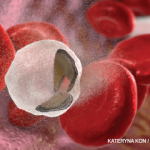 The U.S. Food & Drug Administration (FDA) approved anakinra to treat a rare autoinflammatory disease, deficiency of interleukin (IL) 1 receptor antagonist (DIRA). The administration also approved a new rituximab biosimilar, Riabni, for multiple indications.
The U.S. Food & Drug Administration (FDA) approved anakinra to treat a rare autoinflammatory disease, deficiency of interleukin (IL) 1 receptor antagonist (DIRA). The administration also approved a new rituximab biosimilar, Riabni, for multiple indications.
Anakinra Approved for DIRA
In late December 2020, the FDA approved anakinra (Kineret) to treat deficiency of interleukin (IL) 1 receptor antagonist (DIRA). DIRA is a rare, autoinflammatory disease that occurs during the first weeks of life and is caused by a genetic mutation in the IL1RN gene that encodes for this specific receptor. Patients with this deficiency get unopposed IL-1 signaling that leads to a life-threatening systemic inflammatory response, affecting the bones and skin.1
In November 2001, the FDA initially approved anakinra to treat the signs and symptoms of moderate to severe active rheumatoid arthritis in adults for whom one or more disease-modifying anti-rheumatic drugs were ineffective.2 The treatment was subsequently approved for treating neonatal-onset multi-system inflammatory disease.3
Background: Research supporting this latest FDA approval included patients (N=9) aged 1 month to 9 years old who were evaluated in a long-term natural history study and treated for up to 10 years. These patients received a range of anakinra doses, from 1 mg/kg/day up to 7.5 mg/kg per day.
All study patients attained inflammatory remission, defined as a C-reactive protein level of less than or equal to 5 mg/L. No inflammatory bone disease or pustulosis, and no concomitant glucocorticoid use were reported. The most common adverse events were fever, flu-like illness, gastroenteritis, rash and upper respiratory infection.
During this study, anakinra’s safety profile was consistent with that seen when treating neonatal-onset multi-system inflammatory disease. No new safety signals were identified.
FDA Approves Rituximab Biosimilar
On Dec. 17, 2020, the FDA approved Riabni (rituximab-arrx), which is biosimilar to Rituxan (rituximab).4 This agent is approved to treat adults with non-Hodgkin’s lymphoma, chronic lymphocytic leukemia, granulomatosis with polyangiitis (Wegener’s granulomatosis) and microscopic polyangiitis.
Michele B. Kaufman, PharmD, BCGP, is a freelance medical writer based in New York City and a pharmacist at New York Presbyterian Lower Manhattan Hospital.
References
- Swedish Orphan Biovitrum AB. News release: FDA approves Kineret (anakinra) for the treatment of deficiency of IL-1 receptor antagonist (DIRA). 2020 Dec 22.
- U.S. Food & Drug Administration. Product approval letter: Kineret. 2001 Nov 14.
- Swedish Orphan Biovitrum AB. Package labeling Kineret (anakinra). 2020 Dec.
- Amgen. News release: FDA approves Amgen’s Riabni (rituximab-arrx), a biosimilar to Rituxan (rituximab). 2020 Dec 17.


